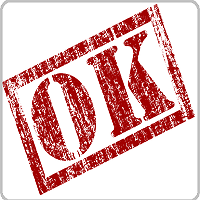OK
Contents:- What is the meaning of OK?
- What is the Full Form of OK?
- What is the Origin of the word OK?
- Where and How does the OK Expression arise?
- What led to the spread of the expression OK?
- It is Correct to Always Say "OK" and "Be Assertive"
- Where is OK From?
- What Country Does OK Come From?
- Conclusion
What is the meaning of OK?
It is an expression that is used as an endorsement or a green light to something. In many instances, it denotes a sense of authorization or approval and permission to continue with the task at hand. It is also used to acknowledge acceptance. However, it sometimes indicates a sign of indifference that is, satisfying but not very exceptional. In the 19th century, it was used by the military to indicate that all was good when it wasn’t.
What is the Full Form of OK?
The phrase OK is assumed to be an acronym of “oll korrect’’, a jesting term for “all correct”. In the 19th century, the amusement for people to create slangs for words was overwhelming. Words were shortened and occasionally misspelled. “No go” was abbreviated to “k.g.”(Know Go). OK emerged as an abbreviation for “orl korrekt,” a teasing term for “all correct”. The craze surrounding the formation of acronyms has been criticized as laziness. Recently, chats and messages have formed their field of acronyms with the emergence of abbreviations such as OMG, WTF, DIY. The list is endless and has been highly ridiculed as a misuse of the English language
What is the Origin of the word OK?
 This one letter word is extremely familiar in the English language. But how did this little word become the most commonly borrowed and used word by other languages? Stories attribute that it comes from Puerto Rican phrase Aux Quais, from German alles korrect, from Scot’s och aye, from Latin’s ommes korrecta, from French’s au quai, or Native America’s okeh.
This one letter word is extremely familiar in the English language. But how did this little word become the most commonly borrowed and used word by other languages? Stories attribute that it comes from Puerto Rican phrase Aux Quais, from German alles korrect, from Scot’s och aye, from Latin’s ommes korrecta, from French’s au quai, or Native America’s okeh.
Singer Pete Seeger, in his song, mentioned that OK was of Choctaw origin. The dictionaries at the time did not dispute this. This etymology, however, lasted until the 1960s. There have been various efforts to try and explain the origin of this phrase. In the 19th century, it became a viral Boston editorial joke. This joke ended up becoming an all-time American expression. Allen Walker Read, an author and English professor at Columbia University, found out that OK was first used by editor Charles Gordon Greene, in a Boston morning post. It was used to refer to the Anti-Bell-Ringing Society, a satirical movement, which passed through Boston going to New York.
It was also believed that the term originated from West Africa, among the Black Slaves. Etymology traces the word to Woolof and Bantu. The word waw-kay was used to signify all right or yes indeed in most West African dialects. This suggestion, which was made by David Dalby, has of late been supported by Joseph Holloway. While Dalby’s claims have been challenged for lack of proof, it is being published did not question the illiteracy in West Africans, in the era of slavery. Despite the West African etymology of being accepted by 1981, it has been extensively published by scholarly sources.
Where and How does the OK Expression arise?
Its simplicity appealed to several cultures. Its endless use and flexibility are beyond limits. Its appeal is in the fact that it is a small word that can fit anywhere to eliminate emptiness. In most Latin American countries, the word is pronounced as it is. For Spanish speakers though, it is spelled as okay. In Brazil, it's pronounced as “okei,” while the Portuguese say “okai’’ which is much similar to pronunciation in English.
Arabs use the OK word widely, especially in British colonies such as Egypt, Jordan, and Iraq. In China, ok is used to mean “confirmed”. It also indicates a sense of achievement. In France, OK is used to agree. The Filipino use okay lang to mean just okay. OK is at times spelled as okey or okay. In India, OK at the end of a sentence or a conversation, is sometimes regarded as rude.
Russians use ok as an affirmation. Indonesians have used it as a tagline on their national broadcaster since 1994. In Hebrew, it is an equivalent of the Hebrew word adequate, while in Maldivian, it's a sign of agreement. The Urdu and Punjabi dialects of Pakistan have made OK a part of their everyday lives. In Malay, They form suffix lah at the end of OK to make it OK-lah, same as Singapore.
Today, OK is used as a default button in dialogue boxes on computers. The user must click on this button to indicate that he accepts the contents. It is also defined as a successful response to various computer programs. OK necessitates the ability to move forward or continue with a task on a computer device. It acts as a command to a majority of mobile phones. This shows that, in a world that is supposed to be technically evolved, it still clings to the simple word derived in the 19th century.
What led to the spread of the expression OK?
 Ordinarily, the phrase Ok would have died out and lost in the moment like most had. However, it created the spotlight and became the slogan of the presidential campaign by the American democratic political party in 1840. The supporters of the candidate and then president, Martin Van Buren rallied “OK,” short for “Old Kinderhook,” his birth town. “Vote for OK” became popular and eventually widely publicized OK. This led to the formation of the O.K. club
Ordinarily, the phrase Ok would have died out and lost in the moment like most had. However, it created the spotlight and became the slogan of the presidential campaign by the American democratic political party in 1840. The supporters of the candidate and then president, Martin Van Buren rallied “OK,” short for “Old Kinderhook,” his birth town. “Vote for OK” became popular and eventually widely publicized OK. This led to the formation of the O.K. club
The initials were used as mud slings by his opponents, with words such as “out of kash”, “or fully confused,” being used to troll him. Although Van Buren was not re-elected, he gave the Ok expression an intrigue that glued on people’s wits and lips.
OK was born at around the time the telegraph was being invented. To reduce the cost of sending messages, telegraph operators would use a simple OK to confirm messages received. OK became a common lingo among people and telegraph operators helped spread it to other countries.
It is Correct to Always Say "OK" and "Be Assertive"
Through its assertiveness, enthusiastic expression, and well, its ability to make one feel contented, Ok is majorly used beyond the English language.
Examples include;
“Ok, I will do it”- to show surrender
“I have got this OK”- to show assertiveness
“Well it looks ok on you”- as a compliment
You can use OK any time anywhere and be OK. OK, ok, ok, okay, O.K, or whichever way this word appears in print entirely depends on the platform being used. The dictionary meaning of this word remains static and does not offer a compromise.
Where is OK From?
Its global acceptance has led many to claim its possession. The introduction of a gesture with an “O” forming at the touch of the index finger and the thumb, become a common jingle in America during Van Buren’s campaign. Consequently, the speculation about where it is from was soon forgotten and it became every other person’s word.
What Country Does OK Come From?
Much as it is said, it is believed that OK originated from America. Claims have it that it also came from West Africa. The debate and confusion surrounding this hotly and extensively used word are endless.
Conclusion:
In the end, it can in the least be said confidently that OK has somehow become washed out. Its literal meaning of “all correct” has different meanings. Whichever story you choose to believe, as long as you are OK with OK, it doesn’t matter where it came from.

No comments:
Post a Comment